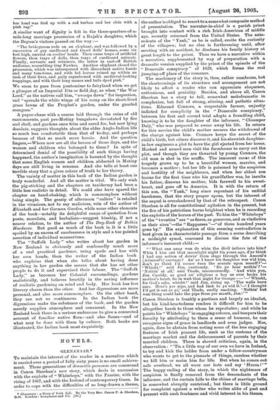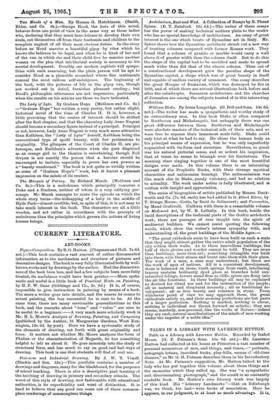GLENANAAR.*
TO maintain the interest of the reader in a narrative which is carried over a period of fully sixty years is no small achieve- ment. Three generations of dramatis personae are concerned iii Canon Sheehan's new story, which deals in succession -with the exploits of "Whiteboys," with the Famine, with the rising of 1867, and with the Ireland of contemporary times. In order to cope with the difficulties of so long-drawn a theme, Glettanaar : a Story of Irish Life. By the Very Bev. Canon P. A. Sheehan, D.D. London : Longmans and Co. [6s.]
brought into contact with a rich Irish-American of middle age, recently returned from the United States. The ante- cedents of the "Yank," as he is called, excite the curiosity of the villagers; but no clue is forthcoming until, after meeting with an accident, he discloses his family history at
great length to the priest. Thus we have a narrative within a narrative, supplemented by way of preparation with a dramatic version supplied by the priest of the episode of the
" Doneraile conspiracy" of 1829, which forms the real jumping-off place of the romance.
The machinery of the story is, then, rather cumbrous, but the shortcomings of its structure and arrangement are not likely to affect a reader who can appreciate eloquence, enthusiasm, and geniality. Besides, and above all, Canon Sheehan has a story to tell, somewhat melodramatic in complexion, but full of strong, stirring, and pathetic situa- tions. Edmund Connors, a respectable farmer, unjustly indicted for complicity in the " Doneraile conspiracy," between his first and second trial adopts a foundling child, knowing it to be the daughter of the informer, " Cloumper Daly," who was prepared to swear away his life. In return for this service the child's mother secures the withdrawal of the charge against him. Connors keeps the secret of the child's birth, but others discover it, and his shrewish daughter- in-law engineers a plot to have the girl ejected from her home. Masked and armed men visit the farmhouse to carry out the plot, and though they are thwarted by young Connors, the old man is shot in the scuffle. The innocent cause of this tragedy grows up to be a beautiful woman, marries, and becomes a mother; but her life is poisoned by the suspicion and hostility of the neighbours, and when her eldest son learns for the first time who his grandfather was, he insults his father, disowns his mother, bids farewell to his sweet- heart, and goes off to America. It is with the return of this son, the "Yank," long since repentant of his unfilial harshness, that the story proper opens, but the interest of the sequel is overshadowed by that of the retrospect. , Canon Sheehan is all for constitutional agitation in the present, but the fire of his patriotism burns brightest when be is recording the exploits of the heroes of the past. To him the "Whiteboys" of the "twenties" are "as fierce, as generous, and as vindictive as their sires"—the " Rapparees "—"of three hundred years gone by." His explanation of this seeming contradiction is best given in a characteristic passage from a scene describing a midnight synod, convened to ,discuss the fate of the informer's innocent child :—
.4' What can anny wan do whin the divil inthers into him? Whin I kim out that moonlight night tin years ago, d'ye think I had any notion of drivin' thim slugs through the Ameral's [Admiral's] carriage ? An' av I knew his daughter was wid him, don't ye think I'd sooner turn the muzzle upon meself ?'—
Whisht !' said Jim, cautiously. Do ye hear nothin' ? Nothin' at all,' said U'hade, unconcernedly. 'And whin you, Jim Cassidy, as good an' riligious a boy as ever broke his mother's heart, lie in wait that night for George—'—' Whisht, for God's sake, whisht !' said Jim, rising up. The walls have ears. Here's yer pipe, and bad luck to ye wid it.'—' I thought I'd get it out av ye,' said Thade, coolly smoking. Nothin' but wan thing could take the pipe from yer mouth, Jim !"
Canon Sheehan is frankly a partisan and largely an idealist, but his kind-heartedness renders it difficult for him to be altogether harsh to those whom he reprobates ; and while he paints his " Whiteboys "in engaging colours, and tempers their ferocity by attributing to them a sense of humour, he can recognise signs of grace in landlords and even judges. Nor, again, does he abstain from noting some of the less engaging features of Irish peasant life, such as the customs of the marriage market and the dethronement of parents by their married children. There is shrewd criticism, again, in the observation : " 'Tis a little way of our own we have in Ireland, to try and kick the ladder from under a fellow-countryman
who wants to get to the pinnacle of things, careless whether we kill him or maim him for life. But when he comes out safe overhead, we all wave our hats and say Huzza I'" The happy ending of the story, in which the nightmare of suspicion is finally removed from the descendants of the informer, and the curtain falls to the chime of marriage -heft is somewhat abruptly contrived ; but there is little ground for complaint against a writer who writes alike of past and present with such freshness and vivid interest in his theme. Two Moods of a Man. By Horace G. Hutchinson. (Smith, Elder, and Co. 6s.)—George Hood, the hero of this novel, behaves from one point of view in the same way as those ladies who, declaring that they must have leisure to develop their own souls, cut themselves off from their husbands and children to the complete neglect of all their most obvious duties. In the story before us Hood marries a beautiful gipsy by rites which he knows she believes to be legal, and when he is tired of her and of the van in which she and their child live he marries another woman on the plea that intellectual society is necessary to his mental development. Possibly our modern sophists will sympa- thise with such reasoning, but the plain person will be apt to consider Hood as a plausible scoundrel whose fine sentiments conceal the most callous self-indulgence. The beginning of the book, with the pictures of life in the gipsy van, though not worked out in detail, furnishes pleasant reading ; but Hood's philosophic utterances are not impressive, particularly when the results on his actions are those we have indicated.
• The Lady of Lyte. By Graham Hope. (Methuen and Co. 68.) —"Graham Hope" has written a very pretty, but rather slight, historical novel of the time of Charles II. It is, however, a little provoking that tho centre of interest should be shifted after the first chapter, and that the charming Lady Anne Nugent should become a secondary figure instead of a principal. Principal or not, however, Lady Anne Nugent is very much more attractive than Kathleen, the "Lady of Lyte" herself, Kathleen being the conventional type of spoilt beauty, with few pretensions to originality. The glimpses of the Court of Charles II. are pic- turesque, and Kathleen's adventure when she goes disguised as an orange girl to the theatre is entertaining, though Nell Gwynn is not exactly the person that a heroine should be encouraged to imitate, especially to prove her own powers as a "beauty unadorned." The book is not quite so vividly written as some of "Graham Hope's" work, but it leaves a pleasant impression on the minds of its readers.
The Marquis of Putney. By Richard Marsh. (Methuen and Co. 6s.)—This is a melodrama which principally concerns a Duke and a Duchess, neither of whom is a very edifying per- sonage. Mr. Marsh manages to make the episode on which the whole story turns—the kidnapping of a baby in the middle of Hyde Park—almost credible, but, in spite of this, it is not easy to take much interest in the book. The characters are all a little wooden, and act rather in accordance with the precepts of melodrama than the principles which govern the actions of living human beings.



































 Previous page
Previous page